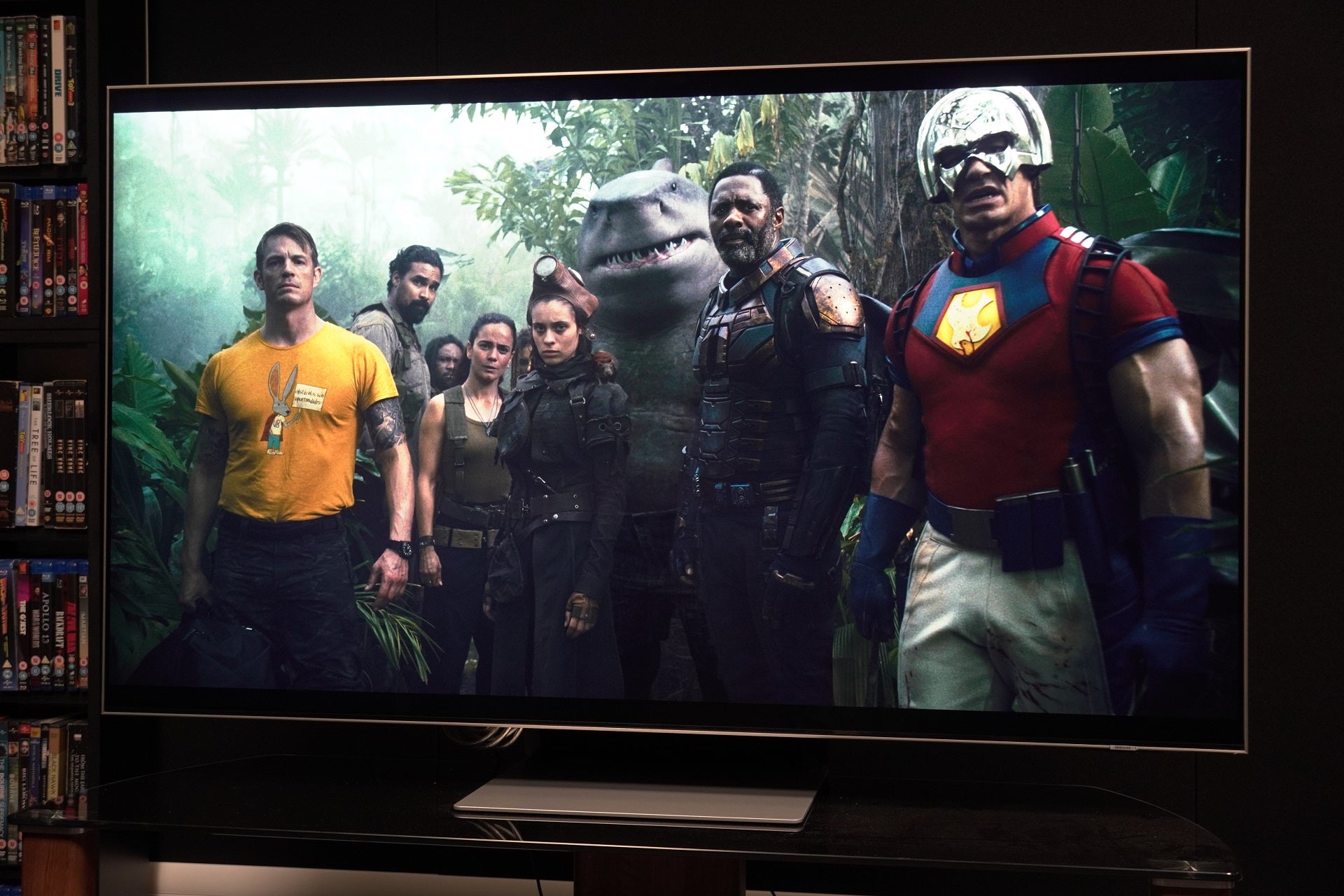Verdict
The QN95B is Samsung’s best 2022 4K TV with dynamite HDR performance, impressive upscaling and a skill set that’s suited for high-end gaming. At its current price, it beats out similarly priced OLED TVs in terms of colour range and volume, though it can’t match that panel technology for outright black levels or contrast.
Pros
- Brilliantly bright and impactful HDR performance
- Elegant, minimalist design
- Lots of entertainment options
- High-end gaming support
Cons
- Average, unexciting sound
- Still some blooming, especially at wide angles
- No Dolby Vision
Availability
- UKRRP: £1499
- USARRP: $2399
- EuropeRRP: €2299
- CanadaRRP: CA$3099
- AustraliaRRP: AU$3499
Introduction
We’ve already tested Samsung’s QN95B in its 65-inch guise, but for those who don’t have space for a TV that big, the 55-inch model is the smallest in Samsung’s flagship 4K range.
This model offers all the bells and whistles of Samsung’s Neo QLED branding, from high brightness HDR to Dolby Atmos sound and Samsung’s Quantum Matrix Mini LED backlight for OLED-baiting black levels.
This is the best 4K 55-inch set you can get from Samsung. Does it mean it’s one of the finest screens of 2022 too?
Design
- Supports the One Connect box
- Slim Infinity Design
- Impressive viewing angles
The QN95B is decked in similar attire to the QN90B, the main difference is the inclusion of the One Connect box that slots into the back of the TV’s stand.
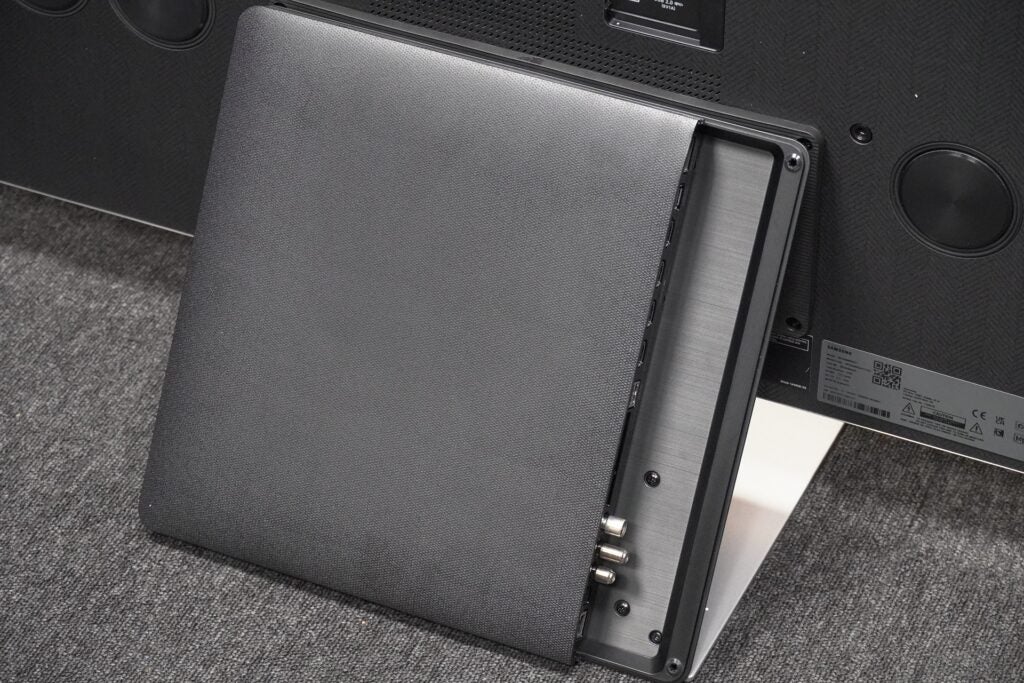
The One Connect holds all the TV’s connections, power supply and processing, fed to the TV via a cable. The TV comes with a choice of two cables, one short and one long, the latter helps if you’re planning to wall-mount. Given the rear panel of the TV is uniformly flat, it’s built to look good on both a piece of furniture and wall. With rumours suggesting the upcoming QN95C could ditch the One Connect box altogether, the QN95B might be the last Samsung 4K TV to include it.
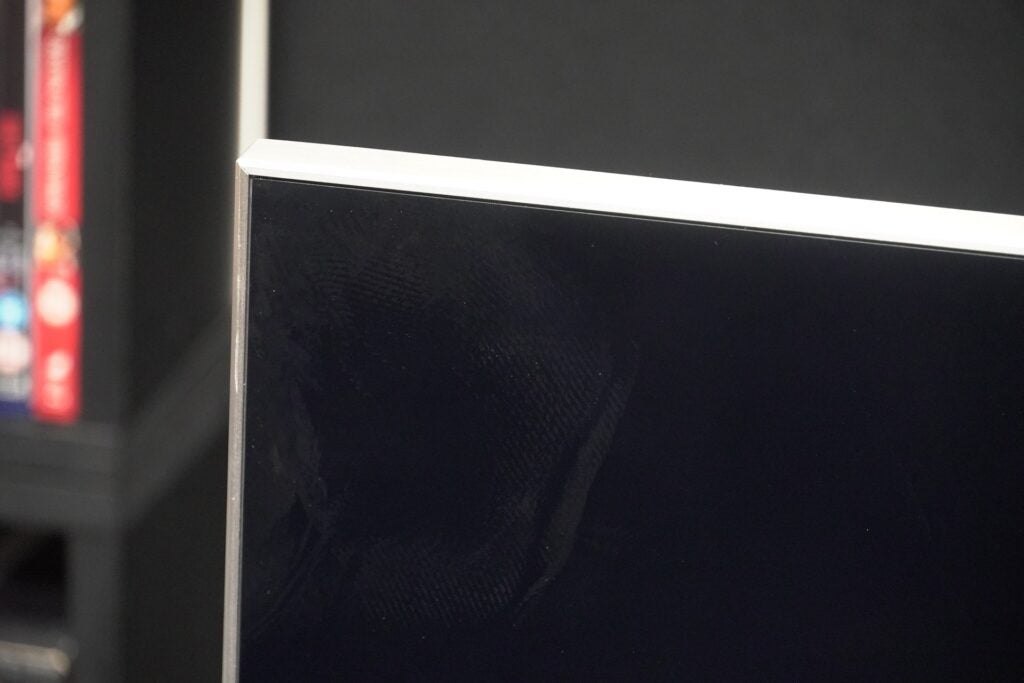
Elsewhere it’s built to the same high quality expected from Samsung. The bezels are slim, the stand is sturdy, and the minimalist Infinity Design ensures all eyes are on the screen. Again, a slight issue is that passing by the TV does cause a slight wobble.
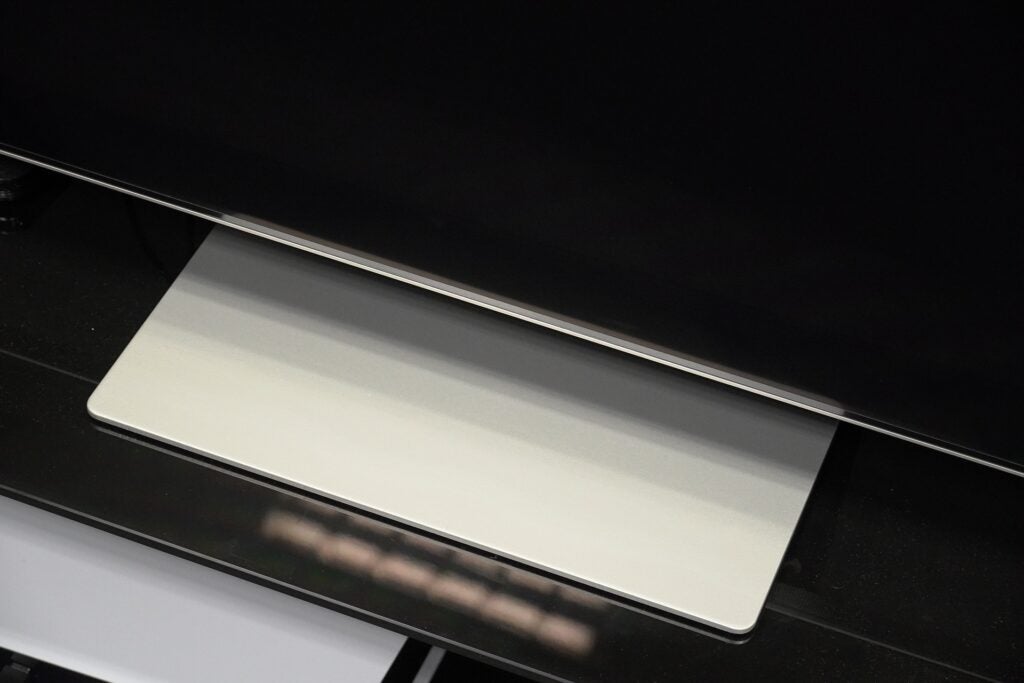
Like the rest of the sizes in the QN95B series, the 55-inch model also packs in a VA panel boosted by Samsung’s Ultra Wide Viewing Angle technology and Anti-Reflection technology.
Viewing angles are excellent in terms of brightness and colour consistency, and more potent than most OLED TVs can dream of. That level of brightness trails off at acute angles, but of more concern is the presence of blooming, with halos around bright objects more visible at an angle. It compromises the TV’s wide viewing performance.
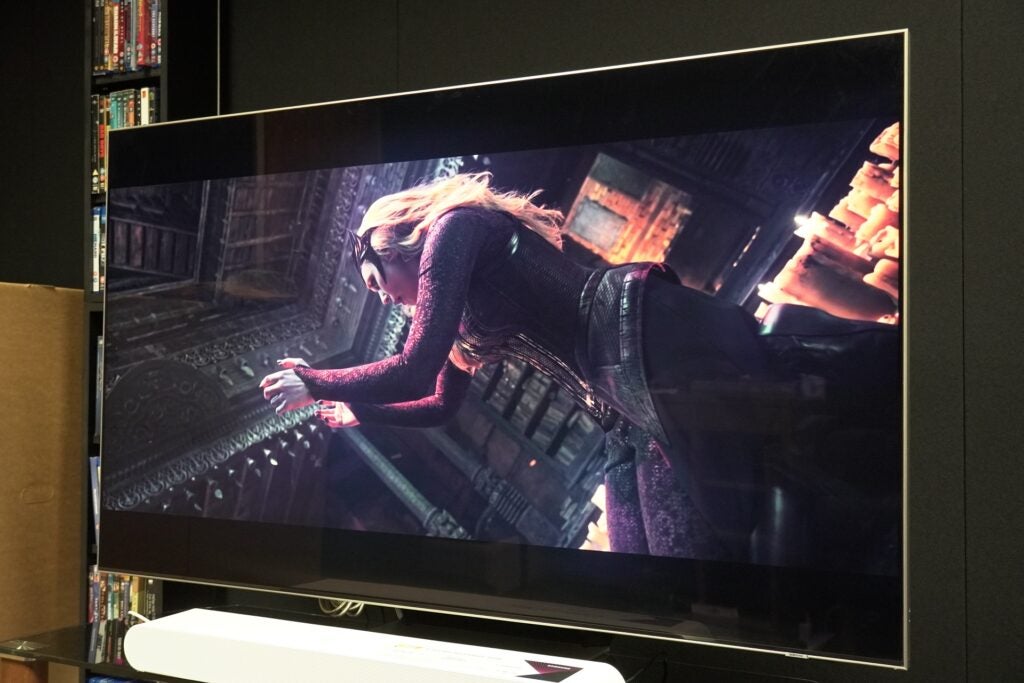
Tizen Interface
- The interface still a little sluggish
- Plenty of cloud gaming app support
- A tremendous amount of content to view
The 2022 models I’ve tested from Samsung have all fallen prey to a sluggish integration of the Tizen interface. Across a few weeks, the QE55QN95B was a little faster on occasion but still sluggish on wake-up.
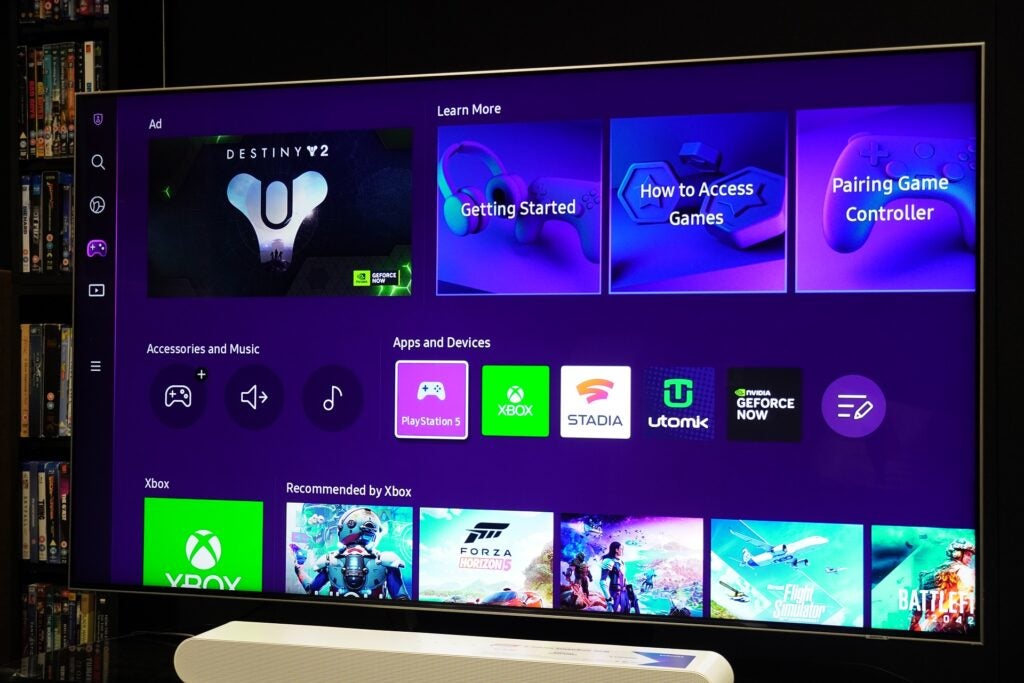
Samsung’s revision of the Tizen Smart Hub for its 2022 range has seen it divide everything into hubs: one for media apps, another for search, Ambient mode and a game area.
Gaming is where you’ll find access to cloud gaming apps such as Utomik, GeForce Now and Xbox Game Pass (which is currently an exclusive). You can also sort out settings and add controllers here.
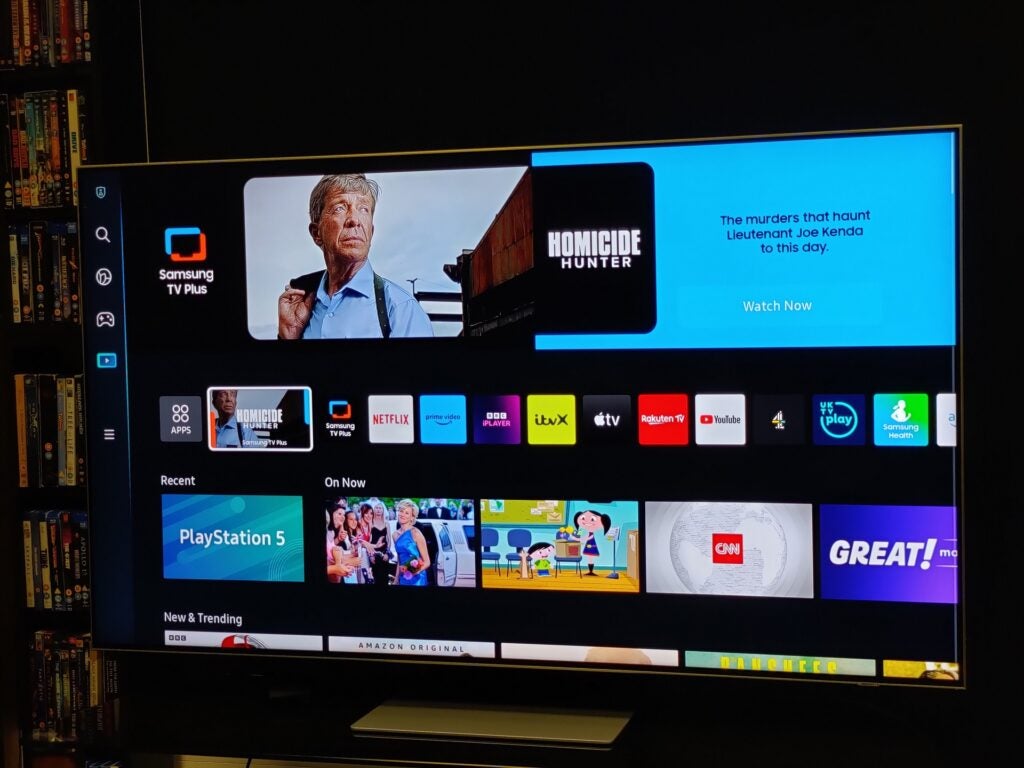
There’s an abundance of streaming apps for movies and music, everything from Netflix, Prime Video, Disney+ to Spotify, Tidal and Qobuz. While Freeview Play isn’t supported Samsung provides all the UK catch-up and on-demand apps in their individual forms. More free TV is provided in Samsung’s streaming-based TV Plus service which has UK exclusive channels such as America’s Got Talent.
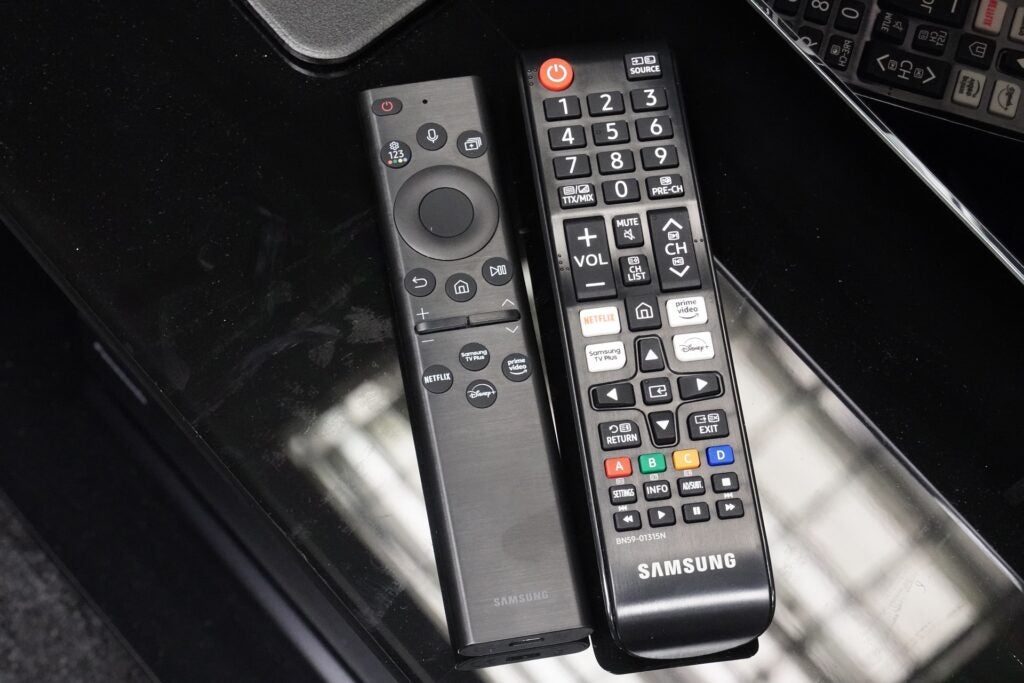
Two remotes are supplied with the QN95B, a stylish, minimalist remote that features a solar power that allows it to be charged by ambient light (or USB-C as an alternative), and the standard wand that carries all the buttons you’ll likely ever need.
I don’t think the revision of Samsung’s Smart Hub is a total success. Samsung’s premium TVs pack in so many features and this interface isn’t the best at revealing the QN95B’s hidden depths.
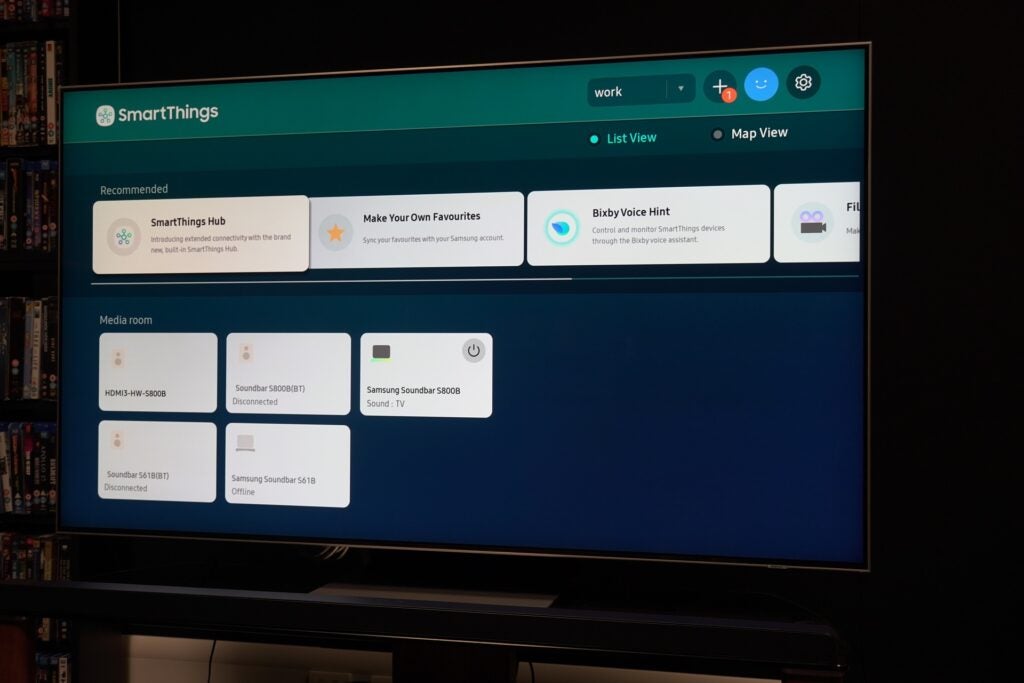
Features
- 4K 144Hz across all HDMI inputs
- Wide voice assistant support
- Not officially certified for Nvidia G-Sync
Another difference thanks to the addition of the One Connect box is that all the QN95B’s HDMI inputs are up to the 2.1 standard, and all four can support 4K 144Hz gaming, which is higher than LG’s C2 and G2 OLED TVs.
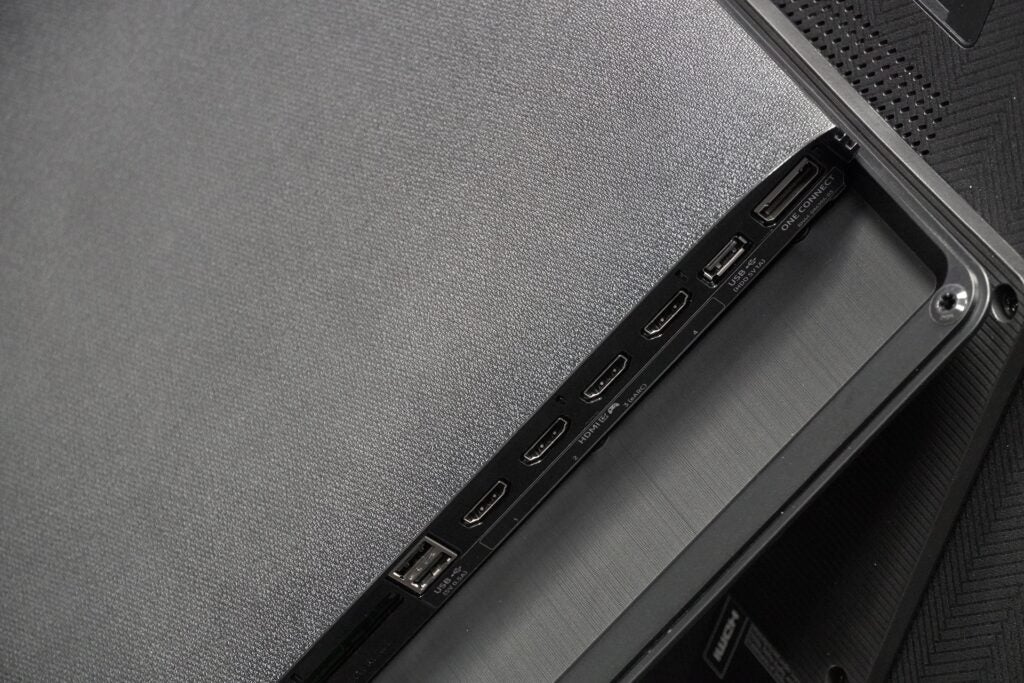
With those HDMI inputs you also get eARC for pass-through of soundtracks such as Dolby Atmos offboard to a sound system. Auto low latency mode (which automatically puts the TV into its lowest latency for gaming), and variable refresh rate support (HDMI VRR and AMD FreeSync Premium Pro). VRR helps reduce screen tearing and can offer even fastest speeds in terms of latency. At 4K resolution I measured the QE55QN95B at 10.2ms, giving the QN95B a leg up against LG’s OLEDs.
Other gaming features hew towards PC gamers in the Super UltraWide Game View (expanding the screen to 21:9 or 32:9 screen ratios), while HDR10+ Gaming improves the performance of PC games and is supported by several Nvidia titles.
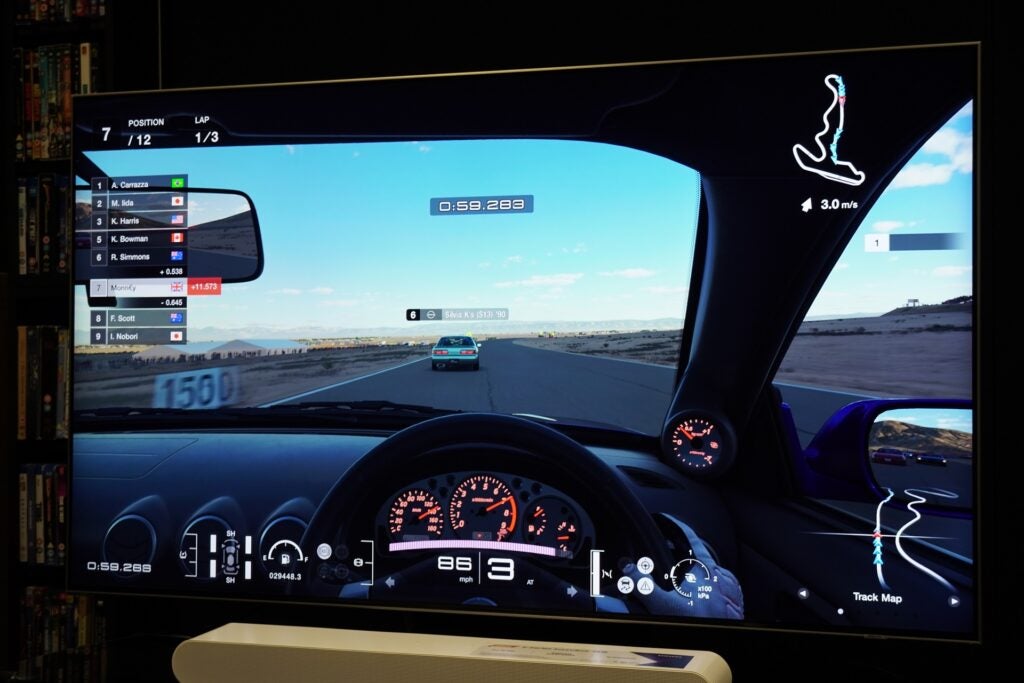
Voice assistance is provided in Amazon Alexa, Google Assistant and Samsung’s own Bixby. The QN95B can act as a hub with SmartThings to interact with other smart products in the home.
The rest of the connections amount to digital optical out, CI+ 1.4, two satellite tuners, an aerial antenna, two USB ports and an ethernet, as well as Wi-Fi and Bluetooth 5.2.
Picture Quality
- Luminous levels of brightness
- Slick upscaling
- Still some blooming present
Where the QN95B also differs from the QN90B is in the number of dimming zones. The higher the number, the more precision a TV can offer in dealing with brightness and mitigating blooming for better black levels. In terms of picture performance, that’s the main reason to get the QN95B over the QN90B.
It hits the same searing levels of peak brightness as the QN90B, its Standard mode is a scorching 2369 nits on a 5% HDR window (and even more impressive 2435 nits on a 10% window). That’s far more than any current OLED is capable of, but also means that blooming – a halo around bright images – is an issue where it isn’t a problem with OLED TVs.
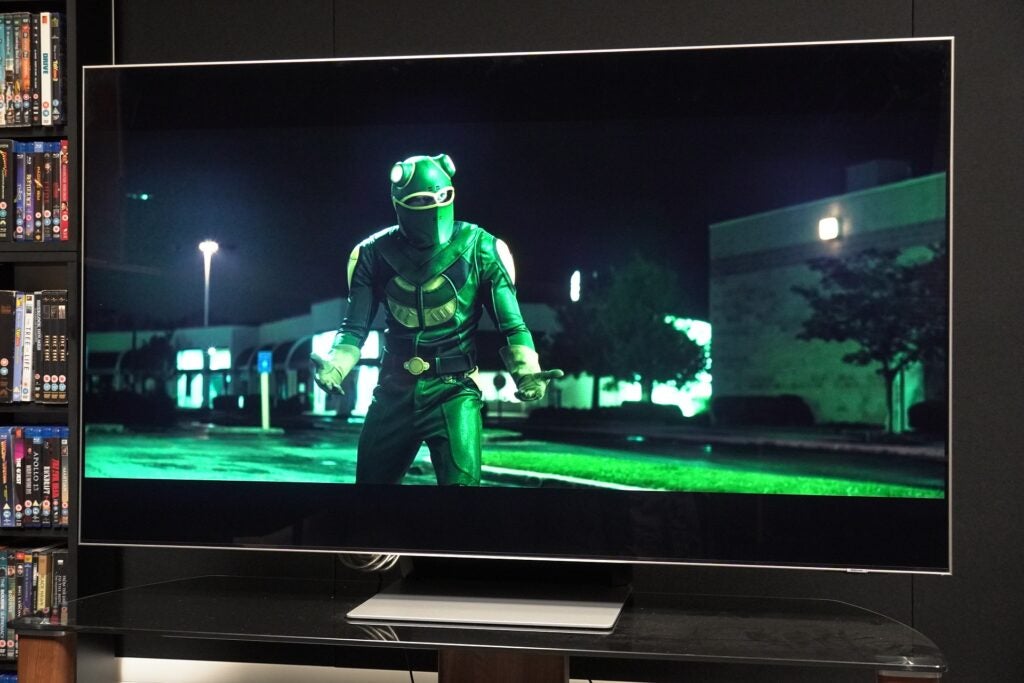
There’s minimal blooming visible when streaming The Menu (Disney+) during the film’s latter stretch when candle lights are used on tables. It’s the same case with The Tomorrow War (again those accursed candles) and at the beginning of She-Hulk episode Ribbit and Rip It when Leapfrog unwisely takes on some goons in a mall parking lot (a haze visible around the parking lot lights). From head-on it’s not too distracting but it is more noticeable at wider angles and in dark room environments too.
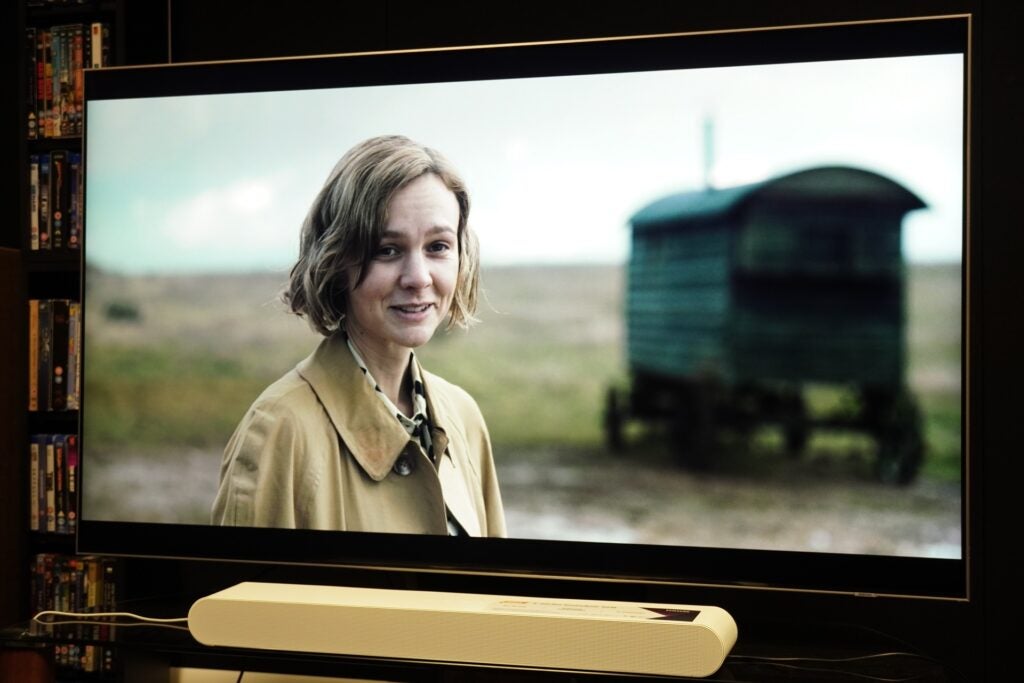
The increased dimming zone count does rein in Samsung’s tendencies to go too bright. For instance, with The Dig on Netflix, it produces a splendid colourful image with a wide and vibrant variety of colours much like the QN90B, but where the QN90B’s brightness caused scenes set at dusk to look like day shots, the QN95B is better at controlling the brightness for a more accurate representation of the scene.
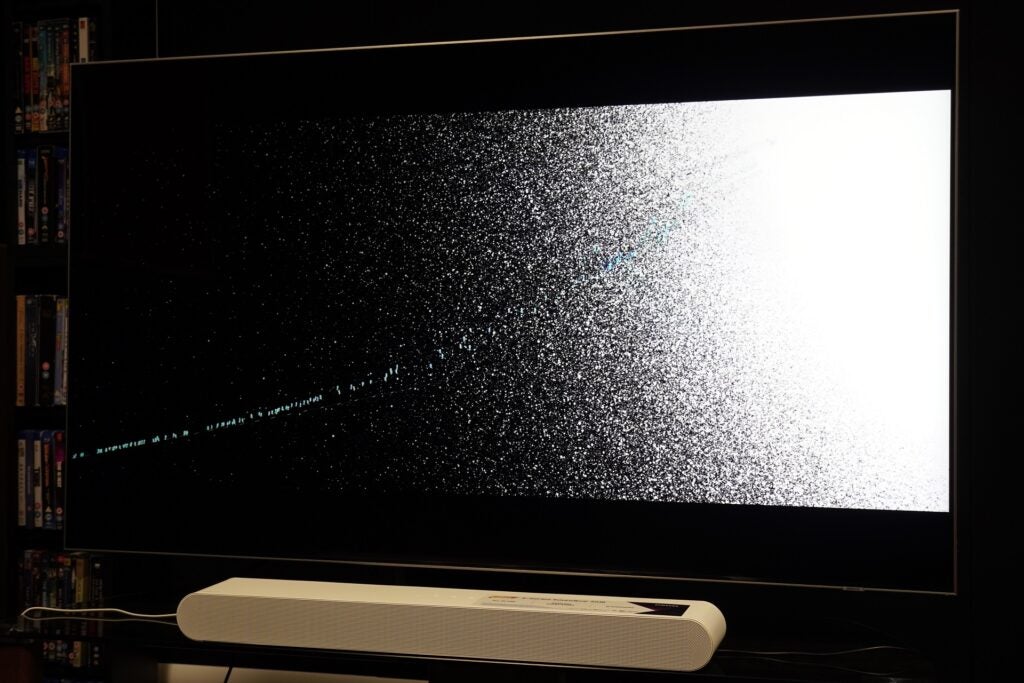
Black levels are treated to near-inky levels of depth, the Quantum Mini LED backlight assists in producing fabulous levels of contrast. Black levels look almost exemplary in Soul (Disney+) when Joe finds himself heading to The Great Beyond, but the tell-tale sign of some slight blooming is visible in the (slightly) hazy appearance of the constellation of stars.
There is an improvement in dark detail levels over OLED in Dr Strange and the Multiverse of Madness, especially shots in the Sanctum Sanctorum that reveal much more of the film’s production design.
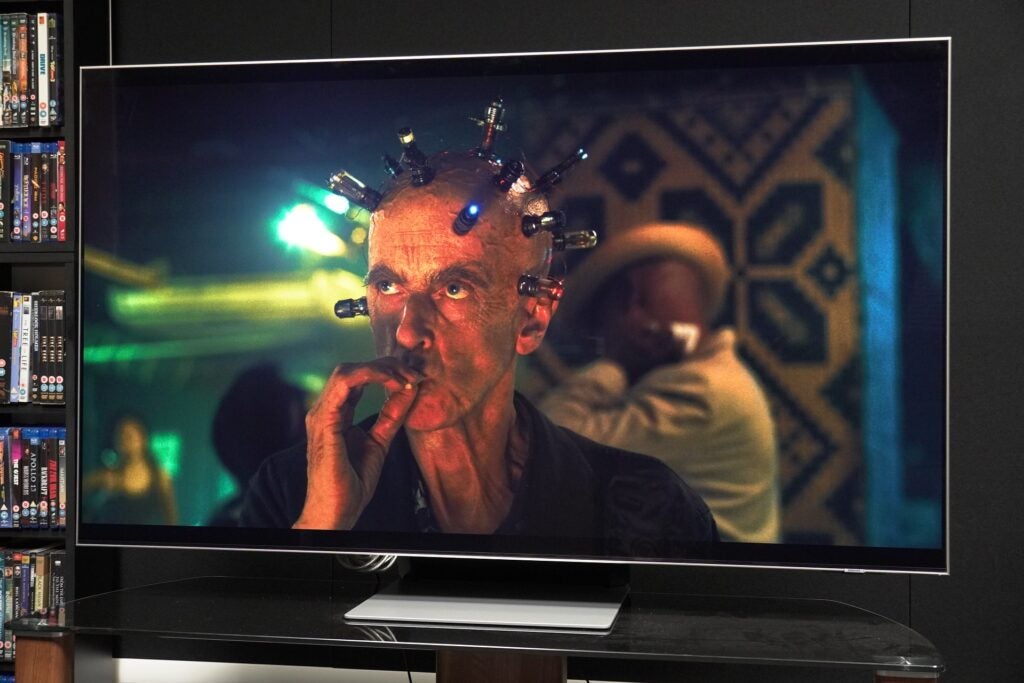
The HDR performance is fabulous, bringing out tones and gradations in colours that eludes several similarly expensive OLEDs I’ve tested. The Suicide Squad in HDR10+ is a fantastic-looking film: reds and yellows pop, black levels impress, and detail levels are consistently high. The QN95B extracts every ounce of performance from the 4K Blu-ray it can locate.
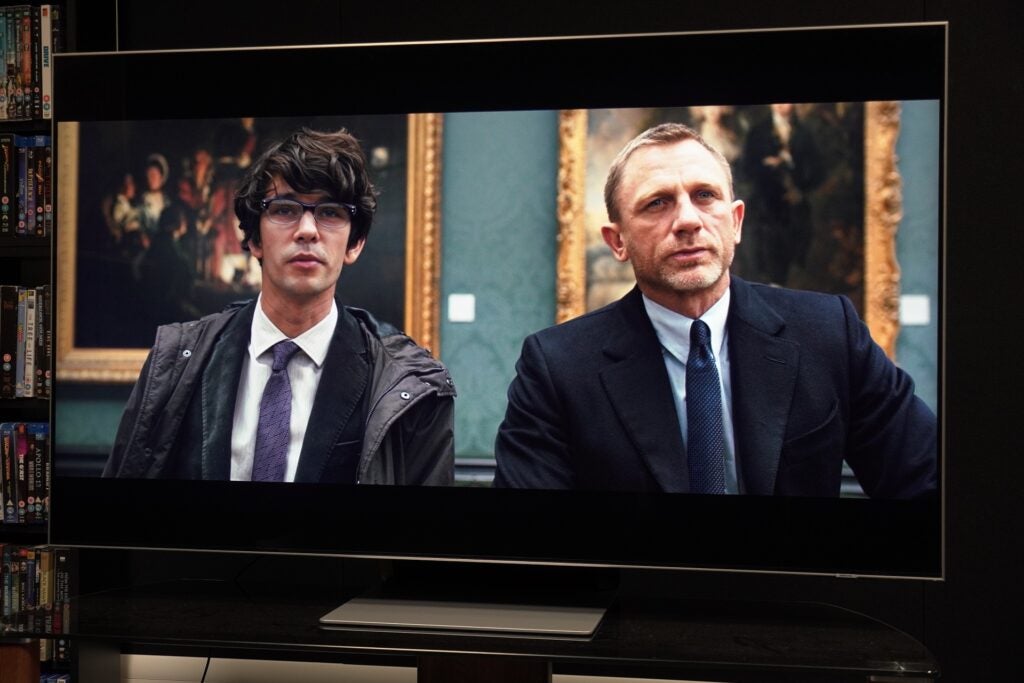
Its upscaling is impressive. Skyfall in HD features strong colours with plenty of hues and tones, Roger Deakin’s lensing is well translated in the cool, milky whites and blues of the London scenes that contrast with the red and orange glows of the Macau sequence. Detail levels are revealing, from Bond’s haggard-looking face to M’s aged lines to the fine detail visible in the suits and tailoring. It’s a bright, colourful, clean and sharp-looking upscaled image.
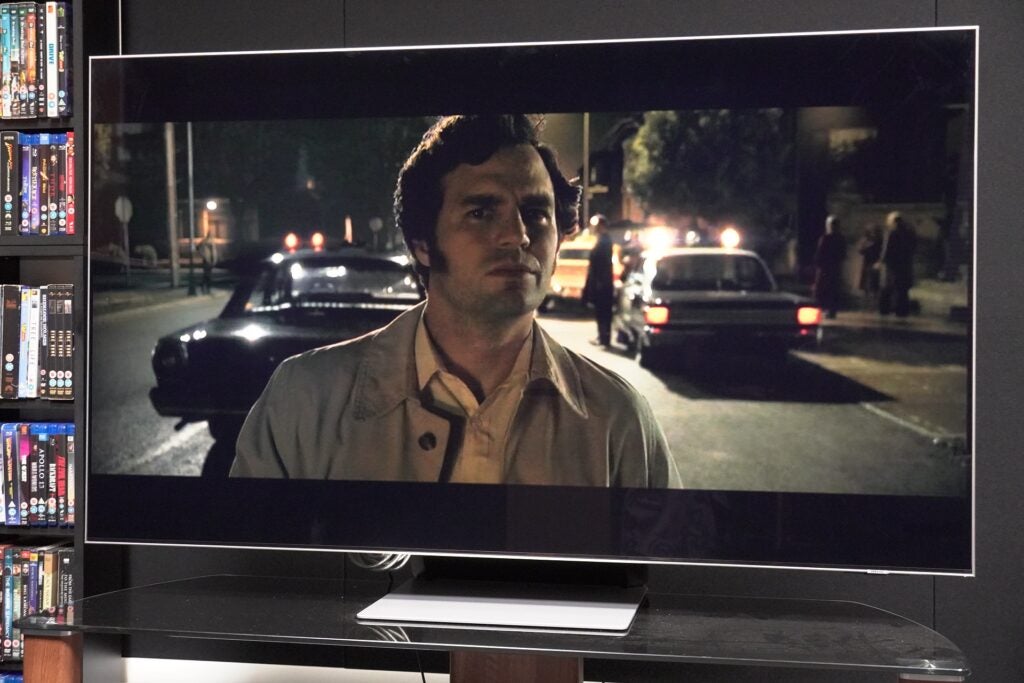
Standard definition content takes a knock but Samsung’s Neural Quantum Processor 4K does the best it can and achieves some laudable results with David Fincher’s Zodiac. There’s no mistaking this isn’t the clearest or sharpest looking presentation, soft and artificial in places but colours are strongly conveyed, and close up of the character’s faces reveal decent detail in terms of wrinkles, spots and facial blemishes.
The QN95B achieves this without looking overly processed, and despite jagged edges and soft edges, noise isn’t as big a factor as I would have expected. That said, you wouldn’t want to watch much SD content on this TV – you’re better off with HD and higher.
Samsung offers two motion settings with its Picture Clarity mode in Auto and Custom and the latter is the less artificial in appearance, producing fewer artefacts and a less fuzzy sense of detail, though whip pans can cause a little distracting noise. In this area Samsung is still a little behind the likes of Sony, Panasonic, and LG.
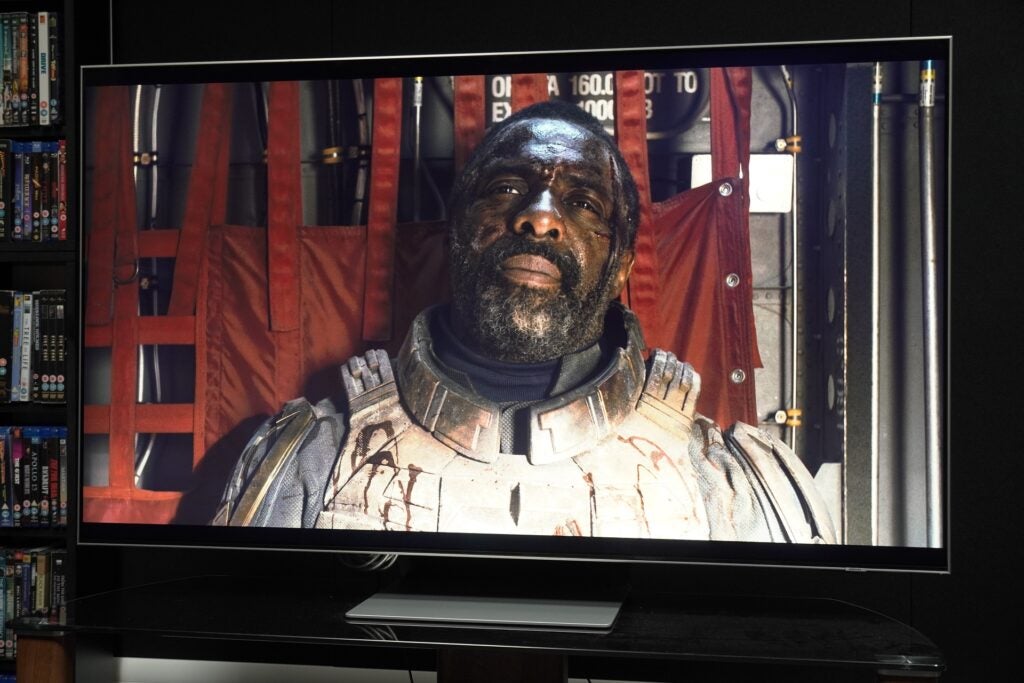
Sound Quality
- OTS system accurately tracks sounds
- Little punch or dynamism
- Support Q-Symphony with Samsung bars
Samsung’s 2022 range of TVs are the first to outright support Dolby Atmos sound, and while that’s a plus, the audio department is the QN95B’s weakest area.
The speakers – the drivers you can see on the rear of the set – generate a crisp and clear sound, but it’s lacking weight and punch watching The Suicide Squad. It’s as if half the sound is there but the most exciting part is tamely delivered.
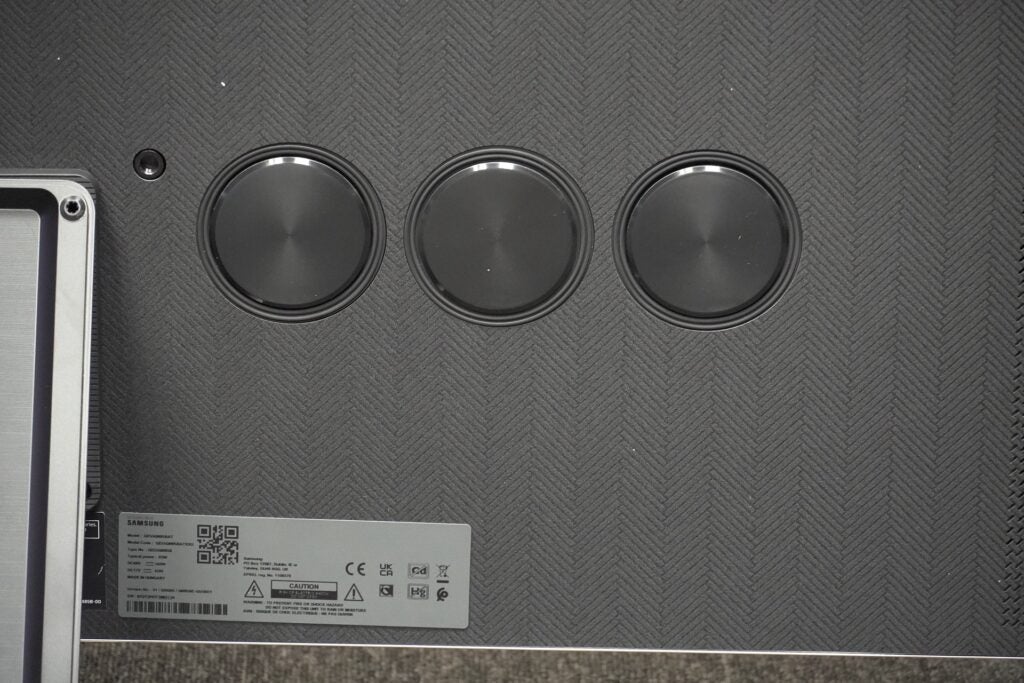
At least with the OTS (Object Tracking Sound) system effects and dialogue are cleverly placed to match their place of origin on screen, and there’s some nifty tracking of effects too. The sound of a helicopter landing in The Tomorrow War is followed as it enters left of screen, goes into the distance, and comes closer again as it lands. Some more heft would make its performance hit with more engagement though.
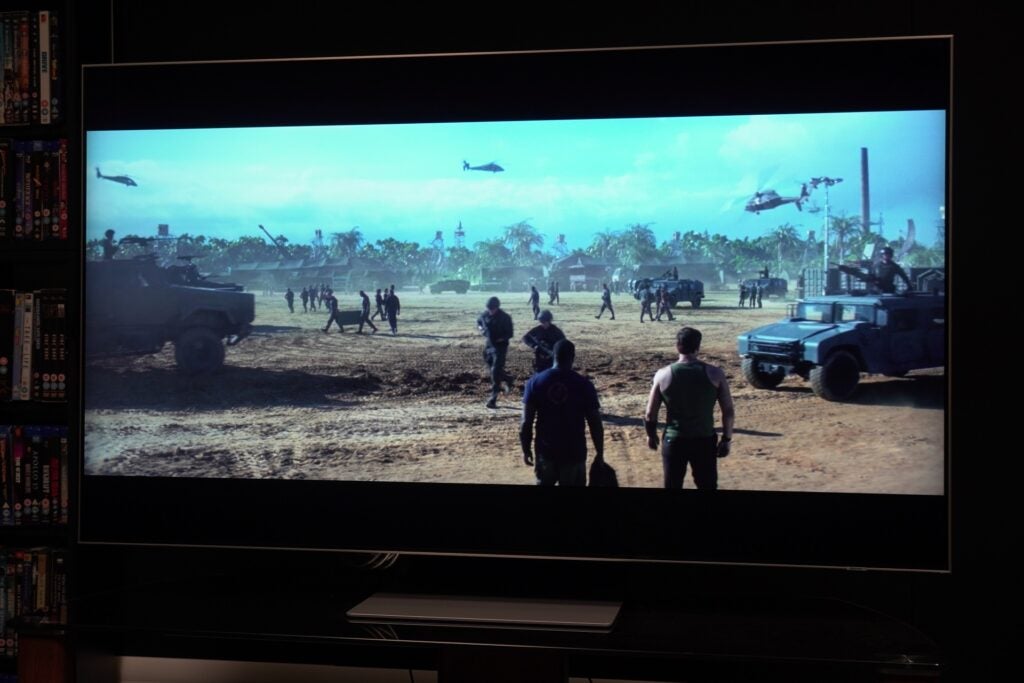
Dialogue clarity is intelligible, at least until the action starts and then it becomes a little lost amid the sea of The Tomorrow War’s effects in action scenes. The size of the sound is good in terms of depth and width, though turning the volume up doesn’t turn up the wick in energy or dynamism.
I’d suggest considering a soundbar and Samsung has plenty of those to partner this TV with.
Latest deals
Should you buy it?
If you watch in a bright room: The QN95B’s level of brightness mark it as an excellent option in a bright room viewing situation, able to resist reflections and ambient light
OLEDs offer a more cinematic experience: OLEDs don’t boast Samsung’s Neo QLED level of brightness, but their contrast, black levels and Dolby Vision support provide a more cinematic performance.
Final Thoughts
The QN95B represents Samsung’s best 4K TV and it is indeed its best 4K TV. The picture quality is brilliantly bright, colourful and punchy, the upscaling impresses, the increased dimming zones minimise blooming for better black levels, and it’s well matched for either high-end PC or console gaming.
The Tizen interface is full of content, but navigation ought to be swifter and you’ll need to budget for a soundbar as the QE55QN95B’s audio is merely okay. The lack of Dolby Vision will cause some wailing among AV enthusiasts but Samsung’s high brightness output works, though the overall performance is perhaps not enough to warrant those with recent flagship Samsung 4K TVs to make a jump here.
How we test
We test every television we review thoroughly over an extended period of time. We use industry standard tests to compare features properly. We’ll always tell you what we find. We never, ever, accept money to review a product.
Find out more about how we test in our ethics policy.
FAQs
The main difference between these two TVs is the presence of a One Connect box for the QN95B. This slots into the back of the TV’s stand and houses all the processing power, connections and power supply. It also allows for Samsung to have HDMI connections that support 4K at 144Hz.
UK RRP
USA RRP
EU RRP
CA RRP
AUD RRP
Manufacturer
Screen Size
Size (Dimensions)
Size (Dimensions without stand)
Weight
ASIN
Operating System
Release Date
Model Number
Model Variants
Resolution
HDR
Types of HDR
Refresh Rate TVs
Ports
HDMI (2.1)
Audio (Power output)
Connectivity
Colours
Display Technology
Sustainability
Trusted Reviews’ holds the fact that global warming is not a myth as a core value and will continuously endeavour to help protect our planet from harm in its business practices.
As part of this mission, whenever we review a product we send the company a series of questions to help us gauge and make transparent the impact the device has on the environment.
We currently haven’t received answers to the questions on this product, but will update this page the moment we do. You can see a detailed breakdown of the questions we ask and why in our sustainability info page.
Jargon buster
Neo QLED
Samsung’s branding for its TVs that feature a Mini LED backlight with their Quantum Dot colour technology
HDR10+ Adaptive
Like Dolby Vision IQ, HDR10+ Adaptive uses a TV’s light sensor to adjust luminance, colours and black levels according to the amount of ambient light in a room for the best picture at all times
Dolby Atmos
Dolby Atmos is an object-based audio format. It expands on 5.1 and 7.1 soundtracks by adding overhead channels. Sounds are referred to as “audio objects”, of which there can be up to 128 audio channels, and these ‘objects’ can be accurately positioned within a 3D soundscape. This allows soundtracks that support the technology to place sounds above and around the listener with compatible kit.



















